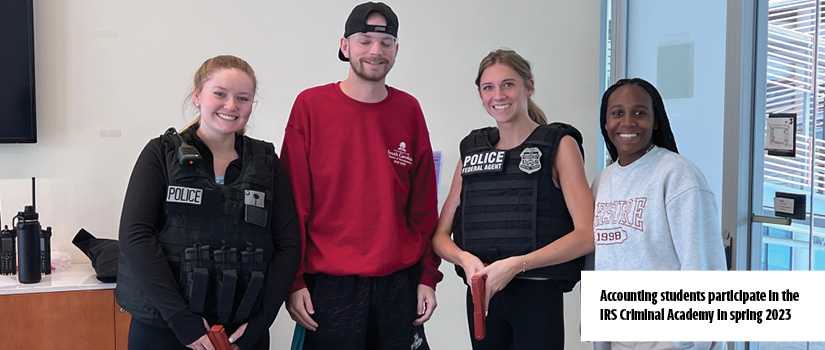Undergrad accounting and MACC students simulate IRS criminal investigations for tax fraud
A group of undergraduate and graduate accounting students got a taste in the spring of how an IRS criminal investigation is conducted to determine if taxpayers are trying to defraud the federal government.
THE IRS Citizen Academy gave students the rare chance to run a simulated fraud investigation that included role plays for interviews, real investigation techniques and arresting the suspected fraud.
Former IRS criminal investigator and current Moore School accounting assistant professor Jason Rasso worked for five years to bring the criminal investigation simulation to USC students.
“The timing was finally right, and we are very fortunate to have these special agents spend their valuable time with our students,” Rasso said.
Rasso said the IRS Citizen Academy provides students with experiential learning that they can discuss in job interviews for their future positions.
“True learning for certain skills and topics like criminal investigations comes through seeing and doing. Experiential learning helps students see the pros and cons of actions and allows them to get through that ‘first time’ experience,” Rasso said. “The students who participated in the Citizen Academy can now say they’ve analyzed records and used that analysis to form conclusions about potential wrongdoing by a suspect in an investigation.”
One team’s students for the spring IRS Citizen Academy were designated as special agents on a case involving identity theft and tax fraud.
“My role was to go undercover and meet with the suspect to provide evidence of intent to commit these crimes and to learn more about the overarching fraud scheme,” said Keagan Hayes, who graduated in May with an accounting and international business degree. “As a part of this case, I had to rely on skills I learned from my ACCT 744 Fraud Examination and Investigation class such as surveillance techniques, dumpster diving, witness/suspect interrogation — all while maintaining good communication with my team members.”
Hayes said his team discovered the suspect he’d been investigating had used stolen social security numbers to file false tax returns to keep the refunds for themselves. As part of the simulation, their team obtained an arrest warrant after searching the perpetrator’s home for evidence.
“During the Citizen Academy experience, I learned a great deal about how difficult surveillance can be, especially when a suspect is walking through a busy place,” he said. “It can be extremely hard to coordinate a large team in those situations, and clear communication is key.”
Hoping to be an audit manager for an accounting firm and later a corporate controller or accounting director, Hayes said the Citizen Academy showed him that he could also enjoy working for the IRS in criminal investigations.
In a Citizen Academy simulation similar to Hayes’ team, Master of Accountancy May graduate Casey Mitchell and his classmates scrutinized an individual who owned a tax practice who was filing fraudulent returns on behalf of his clients.
“He would deduct items from a client’s tax return that had no grounds for deduction in the hopes that the client would get a large refund, thus a bigger payment for the owner,” Mitchell said. “During the investigation, I found myself relying on communication and collaboration skills; it was imperative for my team and me to concisely lay out what our objectives were for each step of the investigation and to trust that our team members would do what they needed to do.”
Mitchell said in the past, his learning focused on major public companies who commit financial statement fraud and that these companies would merely receive a Securities and Exchange Commission sanction. With the IRS Citizen Academy, he said that he learned financial crimes trickle down to smaller businesses that serve average citizens like individual tax preparation companies.
While he considered the academy a valuable experience, Mitchell has accepted his first position after graduation with FORVIS in information technology advisory services.
Recent undergraduate accounting and IB graduate Hayes said the Moore School has provided “amazing” opportunities to learn accounting and get hands-on experience like with the IRS Citizen Academy. Hayes looks forward to continuing with the Moore School in fall 2023 to obtain his Master of Accountancy degree.
Much like the Citizen Academy, accounting faculty look for hands-on learning opportunities to give students real-world experience, Rasso said.
One professor takes his students to the cybersecurity department of a major business where students have the ability to see and interact with real-time cyber threats that occur daily against this business.
“Similar to internships, not only do these experiences help the students learn, but they also offer immense insights for the students in terms of how well they might enjoy — or not enjoy — certain positions or jobs,” Rasso said.
